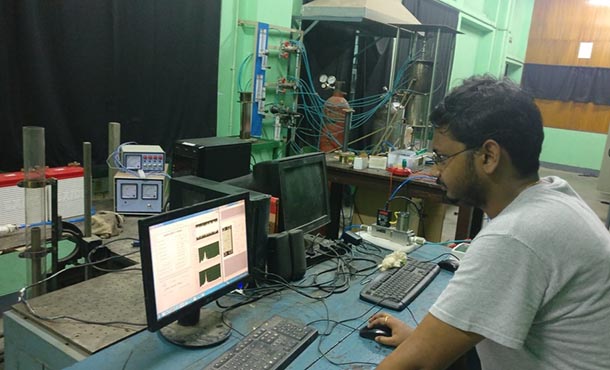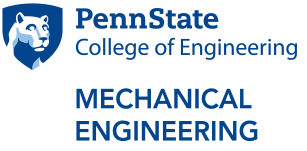
Chandrachur Bhattacharya studies in the lab at Jadavpur University during the summer of 2019. IMAGE: PROVIDED
Engineering research scholarship aims to "rise" aircraft safety, efficiency
9/10/2019
By Sarah Price
UNIVERSITY PARK, Pa. — Chandrachur Bhattacharya, a doctoral student studying mechanical engineering at Penn State, was awarded a Research Internship in Science and Engineering (RISE) Scholarship from Indo-U.S. Science and Technology Forum. During the summer of 2019, he conducted collaborative research in India at Jadavpur University.
Penn State and Jadavpur University have collaborated for the past three years to develop data-driven, machine-learning-based controllers for electro-mechanical systems, with a primary focus on combustion control in airplane engines. Combustion, especially in gas-turbine engines, runs in low-fuel operational states to reduce fuel consumption and nitrogen oxides emissions.
However, in that low-fuel operational state, the combustion engine’s flame is prone to extinguishing and thermo-acoustic instabilities. This behavior develops very quickly, faster than a human operator can reasonably respond. In his research, Bhattacharya is using machine learning to study the flame as it burns in order to detect any off-normal operation, or even predict future off-normal operation. His results have the potential to lead to more-efficient corrective or preventive actions.
“We are trying to make sure with low fuel, the engine is working fine. A pilot can’t respond in five seconds, but a computer can,” said Bhattacharya. “The moment the flame is tending to goes off, the computer can take over. We look at the electro-mechanical system as a whole.”
Bhattacharya has always been interested in aircraft, having a pet dream of becoming a pilot, and he said he finds it fulfilling that his work in India this past summer will help to make them more fuel-efficient.
“Using less fuel isn’t only better for the environment, it helps lower ticket prices,” said Bhattacharya. “If you look at it from a tactical or aircraft perspective, it’s about pilot safety. Machine learning gives you a lot more control.”
In his time at Jadavpur University, Bhattacharya uses techniques developed during his research at Penn State to analyze an experimental combustor in real-time and see its computational effectiveness.
“My models are all theoretical. But seeing it actually work on a real-life set up and seeing it work as it supposed to be, is gratifying,” said Bhattacharya.
Bhattacharya’s data-driven control technique is not restricted to only combustors but can also be used for any electro-mechanical system. The next area the Penn State lab is looking to apply these algorithms to is additive manufacturing problems. Looking forward, Bhattacharya is excited to continue making innovations across engineering disciplines.
“We know now that our theoretical concepts are good and we can go ahead with the research more confidently," he said.


